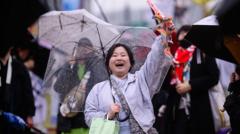South Korea will hold a presidential election on June 3, announced acting president Han Duck-soo, following Yoon Suk Yeol's impeachment for declaring martial law. The move sparked political turmoil and protests, with opposition leader Lee Jae-myung currently leading in popularity.
South Korea to Elect New President on June 3 Following Impeachment

South Korea to Elect New President on June 3 Following Impeachment
Acting President Han Duck-soo announces a snap election after the dismissal of Yoon Suk Yeol due to a controversial martial law declaration.
Following a turbulent political landscape, South Korea is set to hold a presidential election on June 3, as revealed by acting president Han Duck-soo. This announcement comes in light of the recent impeachment of former president Yoon Suk Yeol, who was removed over concerns surrounding a controversial martial law declaration that left the nation reeling.
Yoon's impeachment, upheld by the constitutional court on April 4, has triggered the need for a fast-tracked election to help the country "quickly heal from the wounds" of the crisis, as stated by Han. He expressed regret for the distress caused in recent months, acknowledging the need for clear leadership moving forward.
Yoon's martial law was originally justified by alleged threats from North Korea, yet it appeared instead to arise from deepening domestic issues faced by his administration. The former president now faces additional legal troubles, having been charged with insurrection.
As the political scene reshapes, various candidates are eyeing the presidency. Labour Minister Kim Moon-soo has stepped down to pursue his campaign, joined by Ahn Cheol-soo, a member of the ruling People Power Party with previous electoral experience. However, opposition leader Lee Jae-myung is currently the frontrunner in the polls, boasting a 34% approval rating after narrowly losing to Yoon in the last presidential election.
While navigating through the shadows of political division, South Korea is also grappling with new economic pressures, particularly from steep tariffs proposed by US President Donald Trump. Authorities are pursuing negotiations to address these trade challenges as the nation embarks on a critical new chapter in its governance.




















